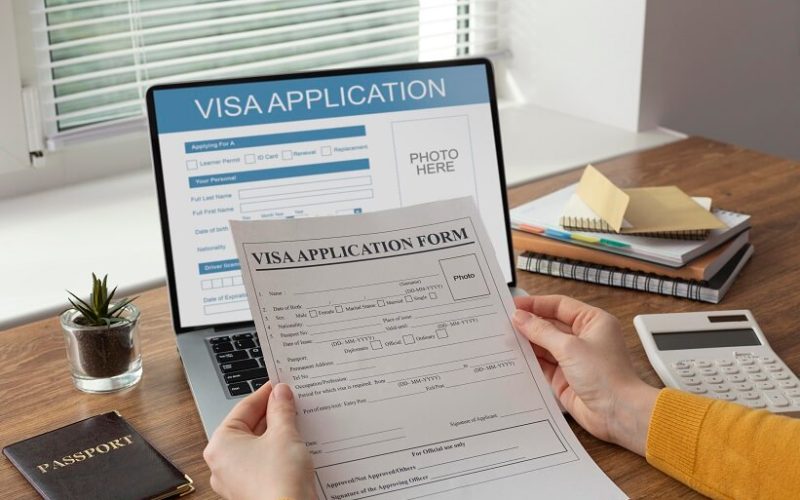

Canada’s student visa rejection rate is rising, making it more difficult for international students to study there. Financial support, English language proficiency, and ties to your home country are a few things you need to know to increase your chances of approval. If you want to know more about Canada student visa rejection and how to solve it, read this Abroadin blog post.
In this guide:
- What does Canada Student Visa Refusal mean?
- What are the most Common Reasons for Canada Student Visa Rejection?
- How to Decrease the Chances of Canada Student Visa Rejection?
- Conclusion
What does Canada Student Visa Refusal mean?
A study found that many employers all over the world are willing to pay higher salaries to students studying abroad.
It is why millions of students worldwide travel to other countries to earn their degrees, and make a new path for the future.
Canada is one of the most popular study destinations, offering various advanced and high-quality education programs.
International students need to obtain a study permit and a Canadian student visa to study in Canada.
The application process can be initiated after being accepted to a DLI (Designated Learning Institute).
According to Immigration, Refugees and Citizenship Canada (IRCC), over 640,000 international students are holding student visas in Canada.
The number of student visa applications has been increasing every year, and so has the number of rejections. Around 30% of student visa applications are rejected each year.
There are many reasons for Canada student visa rejection. International students should be aware of these reasons and take steps to avoid them to increase their chances of success.
Here are some of the most common reasons for Canadian student visa rejection cases:
- Lack of financial support
- Inadequate language proficiency
- Failure to provide complete documentation
- Having a criminal record in the home country
- Lack of enough ties to home country
- Unclear intention to return home after graduation
International students planning to study in Canada should carefully review the requirements for a student visa and ensure they meet all of the criteria.
They should also be prepared to provide detailed and accurate information about their academic and financial background.
By taking these steps, they can increase their chances of having their student visa application approved.
The increasing popularity of Canadian universities has led to a higher number of visa applications, which has, in turn, led to an increase in the number of rejections.
Even students with good academic records may be rejected due to the limited available academic spots.
To minimize the chances of refusal, students should understand the reasons behind a rejected visa application.
Here are Visa Requirements for Indians + Canada Travel Ban 2022, read below:
Visa Requirements for Indians + Canada Travel Ban 2022

What are the most Common Reasons for Canada Student Visa Rejection?
The following are some of the most common reasons for Canada student visa refusal, which you should consider and try to avoid to increase your chances.
1. Financial Instability
To be eligible for a Canadian student visa, immigration officers assess your financial independence and ability to pay for one year of tuition and living expenses at the college.
If they are satisfied that you can do so without going into debt or relying on their government assistance, they will grant you the intended visa.
International students who successfully apply for Canadian student visas usually provide financial documentation showing they can support themselves in Canada for a specific amount of time without working.
However, they often need to provide more documentation to show that they can afford to pay for one year of tuition at the college they are applying to.
The Canadian government expects international students to have the financial means to cover their tuition and other expenses, so they require credible evidence of financial stability.
To avoid this issue, you should provide proof of adequate finances for more than one year and any other relevant financial documentation, including bank statements, proof of employment, or a letter of financial support.
2. Inadequate Documents
The Canada student visa rejection happens when the applicant needs a complete travel history or their identity documents need to be clarified.
If there are gaps in travel history, the visa officer looks at the travel records to see if there are any suspicious periods.
The visa authorities also check identification documents to determine if the applicant has any medical conditions or criminal convictions that would prevent them from being admitted to Canada.
Additionally, the application may be denied if you stated on your study permit application form that you have previous travel experience but need more documentation to support this claim.
It is essential to support travel history with adequate documentation and proof. The identity documents should be straightforward to understand.
To make it easy for the IRCC officer to understand your online application, arrange your scanned documents chronologically.
3. Poor Academic Performance
Visa officers review your academic records to see if you have an excellent overall academic performance. Good grades are essential, but other factors will be considered.
Your English language proficiency test scores, such as IELTS and TOEFL, will also be necessary. If the academic records are inconsistent, this will be a red flag for the visa officer.
International students should be prepared to explain any inconsistencies in their academic records with the help of a counselor.
4. Intent to Stay after Graduation
A student visa is a temporary visa that expires after the international student completes their studies. So, visa officers want to ensure they return to their home country.
Some students may decide to stay in Canada after graduation because of limited opportunities in their home country. However, this could be why a student visa application is rejected.
To increase their chances of visa approval, international students should demonstrate their eagerness to return home after graduation in their application form and visa interview.
They can do this by providing convincing documentation about the job opportunities and family ties in their home country.
5. Inconsistency with Work Experience
If you are applying for a student visa to study a program unrelated to your previous qualifications or work experience, the visa officer may hesitate to approve your application.
The visa officer wants to see that you are genuinely interested in the program and will likely succeed in your studies.
To increase your chances of visa approval, you should be able to explain why you are changing your field of interest.
You should also provide evidence to support your explanation, such as letters of recommendation from professors or employers or transcripts from previous courses.
Whatever you say or mention in your application should be backed up by valid proof. You should be able to provide documentation to support your claims.
For example, say that you have a strong interest in studying medicine. You should be able to provide transcripts from science courses or letters of recommendation from science teachers.
6. Not Having a Letter of Acceptance
A letter of acceptance from a DLI is required for all international students who want to study in Canada. The DLI is the school or university that you will be attending.
The acceptance letter confirms that you have been accepted to the program and meet the school’s requirements.
In addition to the acceptance letter, you must provide proof of your financial resources and English language proficiency.
You may also include any other supporting documents or statements that you believe will strengthen your application.
7. Now, Proper Choice of Course
The visa officers pay close attention to whether your chosen study program matches your future professional aspirations or your prior educational background.
They will raise an issue if they notice that you are suddenly changing your field of interest or stream of study.
Common academic-related reasons for the rejection of a Canada student visa:
- Applying for PG Diploma with very high GPA in Bachelors
- Applying for PG Diploma after Masters
- Career Gap
- Second Masters (non-MBA)
- Program not aligned with prior education
There is no alternative to convince the visa officials that it at least signifies some worth to you.
You must include a thorough personal statement and other records about your academic background. If you are in a situation like this, remember that detailing is the key.

How to Decrease the Chances of Canada Student Visa Rejection?
Here is some valuable information that will help you reduce the chances of your Canadian Student Visa rejection:
- List essential documents required to apply for a Canadian student visa.
- Fill out the visa application form carefully and cross-check all the information.
- Make sure you upload a copy of the offer letter from a recognized Canadian university.
- If applied under the Student Partnership Program, the candidate must have proof of finances.
- If you have relevant work experience, make sure that you submit your bank statements and salary slips as proof.
- Mention your travel history and visa rejections (if applicable) in the visa file.
- While applying online, ensure you answer all the questions on the CIC website.
- Your statement of intent is crucial in making the visa officer familiar with the candidate. So, make sure that you mention your academic achievements and your intent to study in Canada.
What to do if a Canada Student Visa is Rejected?
If your student visa for Canada gets rejected, you can constantly reapply and ensure that you don’t make the same mistakes you made the first time. Here are some steps that will help you move forward.
- Figure out the reason behind the rejection of the Student Visa: There are many reasons for which your student visa can get rejected. Make sure that you know what was the reason for your case.
- Rectify the problem: If you succeed in knowing the mistake that led to the rejection of your visa application, the next involves correcting that mistake.
- Reapply for a Student Visa: While reapplying for a student visa, you can apply for the same country. However, if you have multiple rejections from the same country, you can apply to another country.
There are 22 common reasons here for visa rejection, read more:
Conclusion
The Canadian student visa rejection rate is rising, making it more difficult for international students to study in the country. However, you should keep going even if your student visa application is rejected. You can appeal the decision or reapply with additional documentation. It would help if you also understood the reasons for the rejection to avoid making the same mistakes in the future.
Do you have any experience regarding Canada student visa rejection? Please share them with us in the comments section below.


How useful was this post?
Click on a star to rate it!
Average rating 5 / 5. Vote count: 1
No votes so far! Be the first to rate this post.









No comment yet, add your voice below!